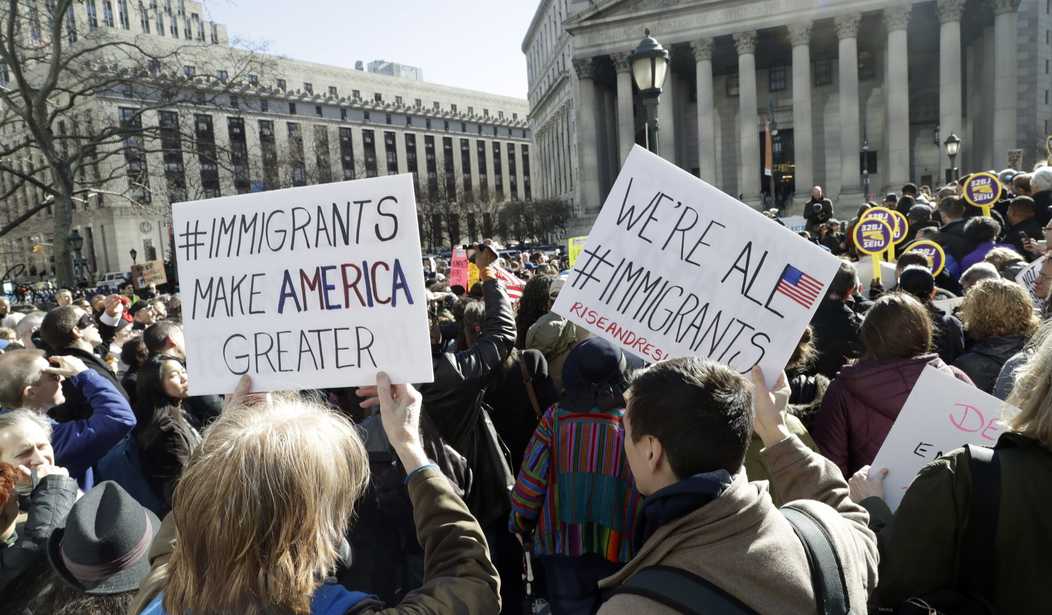For nearly 200 years, the Irish experience has been synonymous with out-migration. One of the earliest studies of the Irish diaspora came from socialist godfather Friedrich Engels who, in his 1848 work, The Condition of the Working Class in England, gave a thorough accounting of Irish migration into newly industrialized England.
Engels, however, wasn’t so much interested with the Irish experience, but with their collective impact on the native working-class. Although himself a factory-owner in England (through his family), he decried the “hardship” and “degradation” imposed on English workers by the Irish influx — particularly on native workers’ ability to maintain labor unions in the face of it.
Engels’s book is one of the first field studies on Marx’s idea of the “reserve army of labor” or the “surplus” population of un- and under-employed that could be tapped at any time by Big Business in order to control labor and labor costs. From his factory in Manchester, Engels observed that by acting as a “reserve at command” for English capital-owners, the Irish “forc[ed] down the rate of wages … to the Irishman’s level,” which “forc[ed] the whole class downward.”
Scottish writer Thomas Carlyle, whom Engels quotes at length, makes the same observation: that due to the Irish influx during this period, “labour, to which mere strength with little skill will suffice,” would be done “not at the English price, but at an approximation to the Irish price.”
The distortive effects on labor markets caused by the importation of “worker armies,” like the Irish in England, would go on to birth immigration-control movements in the UK as well as the United States. As the Supreme Court stated in 1929, the history of all immigration legislation “evinces a progressive policy” of “protect[ing] American labor against the influx of foreign labor.”
Thirteen years ago in the socialist journal Monthly Review, Fred Magdoff and Harry Magdoff likened the fear of unemployment caused by Big Capital’s “reserve at command” to that induced by the “master’s whip.” Talking about the U.S. experience, they wrote that “[e]ach new wave of immigrants entering the reserve army of labor,” from “the Irish in the 1850s” to “the ‘undocumented’ Latin Americans” today, has been intended to induce this same kind of fear.
The topic, however, was fast-becoming taboo by then. Now, it’s totally verboten.
On top of breaking unions by inflating worker-numbers, Magdoff and Magdoff note that foreigner-influxes also operate to divide workers by “distort[ing] consciousness and solidarity with the poison of racism.” This seems to make sense and it’s certainly likely that Big Capital uses immigration-induced racial politics to weaken collective strength in the workplace. Immigration and ethnic diversions likely enable Capital in other ways as well.
In the article “Burying the White Working Class,” about the progressive populism of President Trump, Jacobin editor Connor Kirkpatrick writes that the current liberal elite have now officially chosen racism over capitalism to explain what’s wrong with society today.
The choice, says Kirkpatrick, allows the Democratic Party to “respond” to the hardships of “workers of color” while avoiding what’s truly at the core of their problems; that is, “[c]lass stratification, capital flight, and the war against organized labor.” When “racism can be blamed”, Kirkpatrick writes, “capitalism can be exonerated.” Add the fact that Democrats now look to immigrants as one of their key constituents, and it is little wonder that Marx’s and Engels’ thoughts on Labor don’t get much play today.
What is Labor’s “core” concern is the very topic of Slavoj Zizek’s new compendium of essays on the refugee crisis in Europe; a textbook case, he says, of “class struggle” being relegated and replaced by Capital-friendly “liberal-cultural notions of tolerance and solidarity.” By “treat[ing] refugees as objects of humanitarian help,” Zizek says, European liberals can overlook the fact that the refugee-influx represents a “cheap precarious workforce” arriving, in many cases, “at the expense of local workers.” And being “good humanitarians,” he says, allows the very conditions which compelled them to leave in the first place “to prevail.”
America’s liberals are no different.
Although the humanitarian approach may make some Europeans feel good, Zizek says, their “false” self-blame and “pathetic solidarity with the refugees” only works to distort the real task: to confront globalism and “to build bridges between ‘our’ and ‘their’ working class.”
This describes the liberal elite here perfectly.
While they infantilize, patronize, and draw civil-rights analogies with “the undocumented,” less provincial analysts of the situation are forced to ask: Just where was the Left’s support when these people were back home south of the border? Putting the spotlight on “racist” working-class Trump supporters, instead of on the business elite here and in Latin American will only, as Zizek says, allow the situation that compelled them to leave their countries to prevail.
What’s become of the Left’s approach to Big Capital’s reserve army of migrant-labor and all its effects on working people needs a much more serious critique.









Join the conversation as a VIP Member